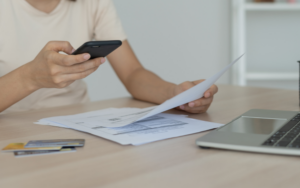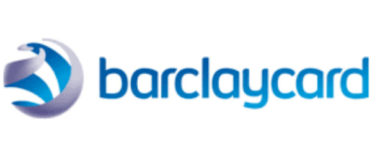 Making the minimum payment on a credit card may seem like an easy way to keep the monthly repayments down. However, only paying the minimum could lead to you paying huge amounts in interest payments and sitting in debt for years on end. In this article, we explain how the minimum payment calculation on a credit card works and how simple steps can drastically change how much your credit card debt costs and how quickly you can pay it off.
Making the minimum payment on a credit card may seem like an easy way to keep the monthly repayments down. However, only paying the minimum could lead to you paying huge amounts in interest payments and sitting in debt for years on end. In this article, we explain how the minimum payment calculation on a credit card works and how simple steps can drastically change how much your credit card debt costs and how quickly you can pay it off.
What is the minimum payment on a credit card?
The minimum payment on a credit card is the lowest amount you can pay towards your balance each month without triggering a penalty fee from your lender and a mark on your credit file. A credit card minimum payment is usually calculated as a percentage of your outstanding balance, though it could also be a flat fee if the percentage is too low, plus interest charges and fees.
Your credit card minimum payment is the lowest amount you can pay towards your debt, but it is not an effective way of clearing your credit card balance. If you want to pay off your debt as quickly as possible, you will need to pay more than the minimum amount.
How to work out the minimum payment on a credit card
The minimum monthly payment on your credit card will be set by your card provider. You can see it displayed on your card statement and on your online account. Alternatively, you can contact your card provider directly to find out what your minimum payment is.
The minimum payment will likely be calculated as a percentage of your outstanding balance, though it could be a flat charge. Your provider will usually want you to pay whichever is higher.
For example, your card provider may calculate your minimum payment as 2% of your balance, plus interest, or £20, whichever is greater. If you had an outstanding balance of £500, including interest charges, your minimum payment would be £20 because that is more than 2% of £500 (£10). A high outstanding balance of £2,000 would mean that your minimum payment would be £40, because that is more than the flat rate of £20.
Keep in mind that if your interest rate goes up – for example because an introductory offer has ended – your minimum payment will increase. As your balance goes down, your minimum payment will decrease. This means that your last payment will be less than your first, assuming you do not add to the balance by spending with the card.
Should you pay more than the minimum payment on a credit card?
Paying the minimum amount works best as a stop gap. Here is an example of how paying more than the minimum payment on a credit card can transform the length of time it takes to clear your balance and the amount of interest you pay overall.
With an outstanding balance of £3,000 and an interest rate of 23%, your minimum payment – calculated as the higher of 1% plus interest or £15 – would start at £87.50. This amount would decrease as you steadily paid off your balance, but clearing your card entirely would take over 19 years. You can see from the table below how increasing your monthly payment, or even maintaining it as you reduce the balance, can change how long you are making payments for.
| Monthly repayment | Time to clear balance | Total interest |
| Minimum (higher of 1% of balance plus interest, or £15) | 19 years, 4 months | £5,095.66 |
| £87.50 | 4 years, 9 months | £1,933.68 |
| £120 | 2 years, 11 months | £1,123.40 |
| £180 | 1 year, 9 months | £649.07 |
| £300 | 1 year | £362.77 |
You can see from the table that maintaining that £87.50 payment, rather than falling back on the credit card minimum payment calculation, would save you years of repayments and thousands of pounds in interest.
In order to clear your balance within a year, you would need to pay £300 a month. This is much higher than the minimum payment and shows how low the minimum payment amount is, compared to what is required to clear the balance in a reasonable timeframe.
Keep in mind that these figures are based on the assumption that the balance of your credit card would not increase through additional spending. If you continue to spend on your card while you are trying to pay off the balance, your minimum payment could go up and down and the length of time you need to pay the card off with minimum payments will increase further.
How is the minimum payment on a credit card paid?
Your monthly bill will contain the details you need to pay your minimum credit card payment, plus how much you need to pay. You can usually do this one of two ways.
Option 1
Make a bank transfer or online card payment for the minimum amount. The details on how to do this will be in your statement.
Option 2
Alternatively, you could set up a direct debit that will pay out automatically every month. You could choose whether this would be the same amount every month or always the minimum payment. The best way to use a credit card is to pay off the balance in full every month, which can also be done automatically through a direct debit.
If you choose to go with the manual payment, make sure to set a reminder on your phone or put in your diary when you need to make the payment. It is important that you always make at least the minimum payment on your credit card and that you pay it on time, so a direct debit is usually the best option. Missing a minimum payment or making a late payment will usually trigger a late payment fee which could lead to a higher interest rate being charged and it is also likely to leave a mark on your credit file making it more difficult to access credit in the future.
Will the minimum payment on a credit card clear your debt?
Making the minimum payment on a credit card is exactly that – the minimum. You are fulfilling your obligations to your lender, but you are not making meaningful progress in clearing your debt. It will take a long time to clear any significant debt by only paying the minimum amount, while the amount of interest you have paid will grow and grow.
The most effective way to pay off a credit card is to clear the balance in full at the end of the billing period, but this will not be an option everyone can afford. If you spend more with your credit card than you can afford to pay back at the end of the billing period, you may have to pay interest on that debt.
The next best alternative would be to incrementally clear the debt by paying more than the minimum amount. You could also explore transferring your balance to a 0% interest card if your current deal is a particularly high rate. You can find out more about balance transfers in our article 'What is a balance transfer credit card and how does it work?'. We also list the best balance transfer options in our article 'Best 0% balance transfer credit card deals'.
Compare credit card deals
We’ve teamed up with Creditec
- Find out what credit cards you are eligible for
- This will not affect your credit rating
- 26.5% APR Representative (variable)

What happens if you can’t afford the minimum payment on a credit card?
Anyone worried that they will be unable to make the minimum payment on a credit card – or any other debt – should contact their provider immediately. The credit card company should be able to help you come up with a plan to repay what you owe in a sustainable and affordable way, for example by restructuring your payments or freezing the rate of interest. It may even be able to pause your payments for a period of time, though this will lead to your outstanding balance growing with interest and the whole repayment process taking longer.
You could also get in touch with an expert for some free, independent debt advice. There are organisations that provide debt specialists who can explain the best course of action for you, help you make a financial plan and even negotiate with creditors on your behalf. We have more information in our article ‘Where to get free debt advice’.
How to find out which credit card is best for you
Comparing different credit cards is a key part of getting the best deal for you. Money to the Masses has helped to simplify this process by partnering with Creditec*, an online comparison service. You do not need to trawl through countless different provider websites hunting for the best cashback or lowest fees, as Creditec’s personalised search results will show you the key details you need to know in one place. Your tailored list will also feature the cards that you are more likely to be accepted for, cutting down the chance of any applications you make being rejected. Your search results are built using a soft credit search, so there will be no damage to your credit score. You can start your search by clicking this link*.
Will making the minimum payment affect my credit score?
Paying the minimum amount on a credit card will not necessarily have a negative effect on your credit score. However, maintaining a high amount of debt compared to the amount of credit you have available will eventually push your score down.
This is because the amount of credit you have used relative to the amount of credit you haven’t used yet (known as your credit utilisation ratio) indicates to lenders how well you are managing your finances. For example, if you have used up 80% of the credit available to you and you are not able to quickly pay it off, lenders will be less confident that you can manage debt or take on more debt. This could make borrowing in the future more difficult. In contrast, paying off any credit card debt in full as soon as possible will help your credit score.
How to pay off credit card debt?
Alongside paying more than the minimum payment on your credit card, the key steps to paying off debt are prioritising what you owe to clear high-interest borrowing, managing your finances through an effective budget and transferring debt where possible.
Credit card debt can be worrying, but with the right plan in place, you can get on the path to being debt-free. We have more information in our article ‘4 easy ways to clear your credit card debt’.
If a link has an * beside it this means that it is an affiliated link. If you go via the link Money to the Masses may receive a small fee which helps keep Money to the Masses free to use. But as you can clearly see this has in no way influenced this independent and balanced review of the product.





